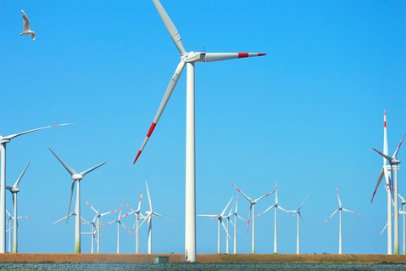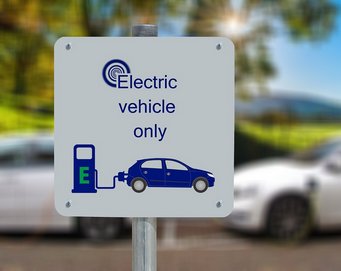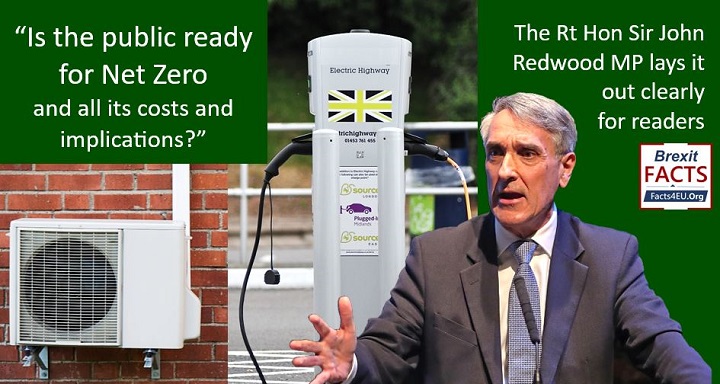“Is the public ready for Net Zero and all its costs and implications?”
The Rt Hon Sir John Redwood MP lays it out clearly for readers
Montage © Facts4EU.Org 2024
Part IV of this new series looks at the practical, day-to-day implications of Net Zero
In addition to immigration, the costs of the rush to Net Zero are a hot topic in this election year. On Monday and Tuesday we looked at greenhouse gas emissions – overall, and then for electricity generation on its own.
A Brexit Facts4EU.Org Series on the Green Agenda
Part I – The EU splashes the UK’s cash on more of its Green Agenda
Part II – Rishi’s rush to Net Zero - Latest figures show there has been no let-up
Part III - Rishi’s rush to Net Zero - Part II - Electricity
Part IV – “Is the public ready for Net Zero?" - Opinion piece by Sir John Redwood MP (This report)
Today we present the thoughts on Net Zero from the Rt Hon Sir John Redwood MP, in the way they affect people in their ordinary lives. He poses some interesting questions and challenges and we suspect many readers will have similar concerns. We think this is an excellent read. The Telegraph published an abridged version of this article under a different heading but we are providing readers with the full version. All our headings and the 'topping and tailing' have been approved by Sir John.
Net Zero - Are consumers ready for changes of this magnitude?
By the Rt Hon Sir John Redwood, MP for Wokingham, with sub-headings and emboldening by Facts4EU.Org
The vast ambition of the net zero policies envisage most people switching their heating to electricity, their travel to bicycles and electric cars, and their diets to vegetarian options. It certainly needs the wholesale conversion of electricity generation from coal, oil and gas to renewables, and a solution to what to do when the sun does not shine and the wind does not blow. We need to ask : "Are consumers ready for changes of this magnitude?”
So far governments have concentrated on doing what should be the easier bits of the changeover. They have considerable influence and control over energy markets and have increased their interventions in them. They have ordered more renewables and pressed for closures of coal based generation. They have used subsidies, tax breaks, windfall taxes, regulations, managed prices and bans to tip electricity generation more strongly towards wind and solar power away from fossil fuel. They have got support or acquiescence from the industry to this pathway.

Industry is all in favour
Industry actively promotes renewable power as a good. At home it is forced to roll out smart meters to an increasingly sceptical group of consumers who have resisted them so far. It has come forward with many new windfarms and solar arrays.
Even this transition in the UK has hit some buffers. More renewables means more grid to handle the great variability of output and to transfer the power from offshore and from the north to onshore and in the south where most of the customers are. The industry is behind on increasing grid capacity, and plans for it are delayed by planning processes that reveal the opposition to pylons in local landscapes. It is all more cost for consumers and taxpayers.
The public loved digital, but there’s less enthusiasm for the de-carbonising revolution
The digital revolution sweeps on because people like its products and services. We have seen a near universal adoption of mobile phones. The majority have signed up readily to the internet, have liked downloading entertainment of their choice when they want it, have turned to social media and on-line meetings to keep in touch with friends and family, have undertaken many a Google search, let their photos and memos be stored on an Amazon web server and usually use Microsoft software.
A handful of leading US companies have swept the globe with their new products and services without government subsidy, tax break or exhortation.
So far the green revolution has not fired the same enthusiasms
Battery electric cars are still a hard sell. Heat pumps with a £7,500 subsidy do not fly off the shelves. Whilst many people do say global warming is a problem and something should be done about it, few think it sufficient of a problem that they need to change their travel, heating and diet.
There are determined minorities on both sides of the argument. One group say it is essential people are made to change to stop the rise in temperatures. They want tougher tax rises, more restrictions on drivers and bans on fossil fuels. One group says it is all nonsense, with a variable climate affected by many things in addition to human carbon dioxide. They do not want the government interfering and think adaptation much cheaper than prevention if temperatures do rise.
The ‘middle way’
The majority in the middle would like policy to be gently pointing in a less carbon direction, but not in a way which would worsen their living standards and put up their costs.

The all electric battery car is mainly bought by fleet buyers who benefit from a tax break and have to show their shareholders they are taking Net Zero seriously. Hertz car rentals has recently announced it bought too many electric cars and is unable to rent them all out, so it is selling some of its fleet.
In the UK most individual car buyers think battery cars are too dear, worry about their range and how you would be able to recharge them. Some think it would be better to develop synthetic fuels which can already be produced in small quantities. These work in conventional engines and can be supplied through existing filling stations.
Pumping up
The heat pump is an even more difficult sell. If like many you have an older house you first need to spend a lot on disruptive works to properly insulate the whole building. You then face an installation and supply cost of around £15,000 before subsidy, with yet more works. You may need to put in bigger pipes and radiators to get it hot enough. Whilst the heat pump does cut the amount of energy needed to heat the home, given the much higher cost of electricity per unit of energy the running costs can still come out higher than a gas boiler.
Some think it better to keep a modern gas boiler and change the gas fuel used to fire it. Increasing volumes of hydrogen or its derivatives made from renewable electricity and water could be fed into the gas supply as the power becomes available. There is little point people buying a heat pump system all the time we depend on gas-fired power stations for the extra demand. Why burn the gas in a remote power station, losing energy in transmission, when you could burn it at home?

Getting to the meat of the argument
More people are turning to vegetarian diets but no political party is going to ban meat or impose a special meat tax any time soon.
When the Dutch tried to cut back animal numbers on local farms as part of a Net Zero strategy there was a political earthquake with a new Farmers party and the Wilders party helping evict the government that did it. The best way to wean people off methane intensive animal products is by producing better alternatives.
In summary
The world cannot get to Net Zero without major changes of consumer behaviour. The digital revolution shows people are willing to make big changes in the way they work, enjoy entertainment and talk to each other if you produce great new products and services.
The Green revolution designed by global civil servants and forced upon us by governments still has to find the iconic products that would fire the imaginations of families. People do not want a landscape covered in pylons, a car that cannot make it easily to the next working charging point and a heating system that is a lot dearer than the one they have got. They do not want to be stuck in more traffic jams as highways authorities make it ever more difficult to get about in a van or car.
More do now worry about what happens to everything electric when the wind does not blow and when evening darkness has closed down the solar.
- By Sir John Redwood, MP for Wokingham, 05 Apr 2024, re-published by permission.
Some extra information from Facts4EU.Org which backs up some of Sir John's comments :-
Latest market share of electric cars for individual sales is falling
The motor industry body, the SMMT, reported this week that share of sales of electric cars to individuals has fallen in the last year. The share of the EV market has fallen from 16.2% to 15.2%, in a sign which does not bode well for the government’s targets.
Sales of electric cars are failing to keep up with the wider market, and the industry is calling on the government to take action to subsidise private sales.
"A sluggish private market and shrinking EV market share... show the challenge ahead," said Mike Hawes, the SMMT's chief executive. It’s no wonder they are worried. Car manufacturers have to meet quotas of EVs sold. This year’s quota is 22% - which looks unlikely to be met - rising to 80% by 2030 and hitting 100% by 2035. If the manufacturers fail to meet these quotas they could face fines of up to £15,000 per car, which would effectively put them out of business and mean that the UK would no longer have a vehicle manufacturing industry.
Observations
In further parts in this series we will look in detail at the scientific evidence for this rush to Net Zero.
In this fourth part we chose the Rt Hon Sir John Redwood MP’s overall take on public attitudes to what is being imposed on them. As ever he makes very interesting points but of course we leave our readers to tell us what they think.
If you can support our work we would be most grateful.
Facts4EU.Org needs you today
We are a 'not for profit' team (we make a loss) and any payment goes towards the actual work, not plush London offices, lunch or taxi expenses, or other luxuries of some organisations.
We badly need more of our thousands of readers to become members, to support this work. Could this be you, today? It's quick and easy, we give you a choice of two highly secure payment providers, and we do NOT ask you for further support if you pay once. We just hope you keep supporting us. Your membership stays anonymous unless you tell us otherwise.
Please don't assume that other people will keep us going - we don't receive enough to survive and we need your help today. Could you help us? We rely 100% on public contributions from readers like you.
If you believe in a fully-free, independent, and sovereign United Kingdom, please join now by clicking on one of the links below or you can use our Support page here. You will receive a personal, friendly ‘thank you’ from a member of our team within 48 hours. Thank you.
[ Sources: The Rt Hon Sir John Redwood MP ] Politicians and journalists can contact us for details, as ever.
Brexit Facts4EU.Org, Sat 06 April 2024
Click here to go to our news headlines
Please scroll down to COMMENT on the above article.
And don't forget actually to post your message after you have previewed it!
Since before the EU Referendum, Brexit Facts4EU.Org
has been the most prolific researcher and publisher of Brexit facts in the world.
Supported by MPs, MEPs, & other groups, our work has impact.
We think facts matter. Please donate today, so that we can continue to ensure a clean Brexit is finally delivered.
Paypal Users Only - Choose amount first
Quick One-off
Monthly




Something to say about this? Scroll down and be the first to comment